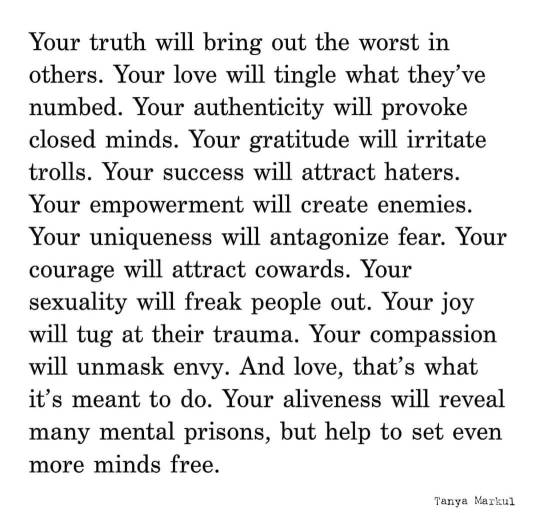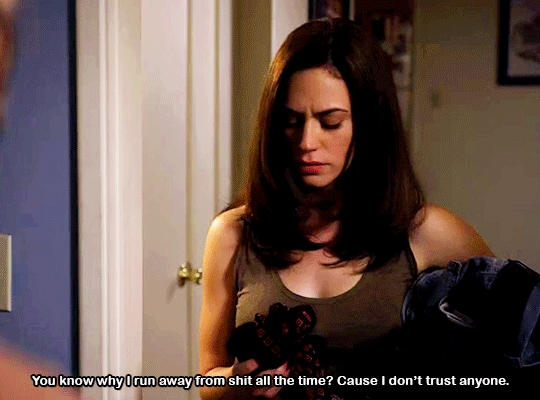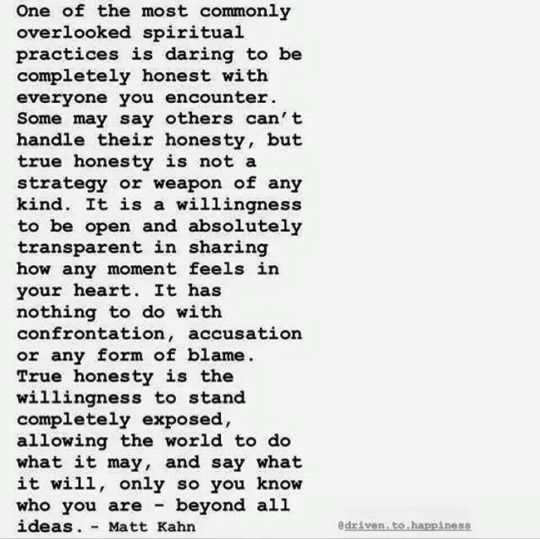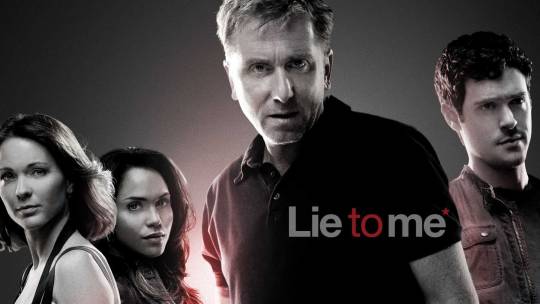#radical honesty
Text

#alchemy#wild woman#divine feminine#radical honesty#wellness#authencity#relationship#quotes#tanya markul
21 notes
·
View notes
Text
When we express only our appreciation and withhold our anger, we lose our ability to be fully present with the ones we love, and, sooner or later, we become less able to appreciate them. This is often why relationships end and families break up. Repressing anger to control other people's behavior (in this case, to keep them from leaving) is ultimately what leads to our inability to make contact with them.
-Brad Blantony, Radical Honest: How to Transform Your Life by Telling the Truth
#bookshelf#radical honesty#brad blantony#books that have held me at gunpoint for several days now#as someone who has been told their whole life that their anger is scary and needs to be restrained#this has been ! oh boy#shadow work
19 notes
·
View notes
Text
'How are you?' he asked.
'You know,' I said. 'Just thinking about jumping off . . . But the thing is, if I did, I would probably only break a leg. We're not high enough for any real chance at death.'
Katherine Lin, from You Can't Stay Here Forever
#death#morbid#depressed#dialogue#radical honesty#quotes#lit#words#excerpts#quote#literature#not doing well#katherine lin#you can't stay here forever
4 notes
·
View notes
Text
excerpts from 'euphemism' - exurb1a
"If we banned stones and all lived in glass houses then radical honesty would probably work fine,
If we could peer into microscopic wormholes back through the past and all historical slights and kindnesses were as available as air, constantly speaking one's mind might well work,
But we're not there yet,"
...
"We don't tell kids they're going to die one day,
We don't tell friends that haircut is a bus crash,
And in both cases silence is a kindness,
What an incredibly important amount of acquiring a language
consists of learning when to shut the hell up."
8 notes
·
View notes
Text
Watch "The Power of Radical Honesty - Dr. Anna Lembke" on YouTube
youtube
#radical honesty#honesty#trust#health#relationships#psychology#philosophy#therapy#trauma#awareness#addiction#drugs#Youtube
2 notes
·
View notes
Note
Aww why emotionally unavailable 🥺🫂

3 notes
·
View notes
Text
Setting boundaries with people you love and care about is a good thing and should be done more
#boundaries#mental health#relationships#communications#respect#self love#radical honesty#finding balance
3 notes
·
View notes
Text

(via soberscientistlife)
9 notes
·
View notes
Text
Lie To Me
New Post has been published on https://grahamstoney.com/communication/lie
Lie To Me

One of my favourite TV shows is Lie To Me. Tim Roth plays Dr Cal Lightman, an eccentric expert in deception detection who runs his own consulting business primarily assisting lawyers and prosecutors get to the truth. There’s always a story behind the story, and the trick is to work out who’s lying about it. His techniques combine reading of facial microexpressions, body language, gestures and human behaviour to discern the true emotions of everyone involved; often including his own staff.
Having learned the art of stripping away people’s facades to reveal what is really going on underneath, Dr Lightman has an arrogant edge about him, which is tempered by his paranoia and the painful dysfunctional relationships that he finds himself in. He sees through the white lies that other people spin to soften the real truth from him, and relies on his ability to cut through the protective shields of other people’s personalities to avoid exposing his own vulnerabilities. Dr Lightman was initially driven to study microexpressions by guilt after the suicide of his mother, who fooled her psychiatrist into into thinking that she had recovered enough from her mental problems to gain weekend release from a psychiatric institution; when in fact her aim was to get out just so that should could attempt suicide. The grief surrounding his mother’s death, and his inability to prevent it, is something he still hasn’t really got over.
It is ironic that in his quest to get the truth out of other people, Dr Lightman and his staff often resort to theatrics and outright deception. He will set up a false scenario or make deceptive statements purely to see how the person in question will respond; will they take the bait? Will they react with fear or shame? Will they trip up and inadvertantly reveal the truth? Hell-bent on getting to the truth, he is prepared to lie and cheat in order to do it. Yet because we can see that underneath it all he’s quite a flawed character, he ends up coming across as really likeable. Getting the balance just right to make this happen is where the real acting skill is, and reminds me of one of my other favourite abrasive characters, Dr House in the show House, played by Hugh Laurie.
Aside from the interesting drama that unfolds on the show, Lie To Me has a lot to teach about human behaviour and interactions. The show is based on the scientific work of Paul Ekman, a psychologist who has studied the relationship between emotions and facial microexpressions. Main characters in the show refer to emotional indications in the expressions or mannerisms of the people they are working with, based on Ekman’s work. We see realistic portrayals of guilt, shame, honesty, anger, resentment, scorn and other emotions, cleverly intercut with pictures of known celebrities in the same emotional states while going into ad breaks. Ekman’s research has found that most people are relatively poor at reading facial microexpressions, but can be trained quite quickly to become better at empathising with other people through the use of a microexpression training set. Not only are we all fascinated by lying, and how to detect it, but this basis in real science makes for an intelligent drama.
The relationships between the main characters working with and for Dr Lightman always seem to be coloured by the absolute requirement to be honest with each other. Any deception is immediately picked up, given that they’re all trained to recognise it instinctively. This seems to add to the tension between them, and particularly between Dr Lightman and his most senior colleague Dr Gillian Foster, played by Kellie Williams. Another character Eli Loker, played by Brendan Hines, subscribes to the theory of radical honesty described in the book Radical Honesty by psychologist Brad Blanton, which really blew me away when I read it recently. As a result, Loker often appears abrupt in his interactions with other characters. Blanton’s theory is that most human stress is caused by our unwillingness, inability, or inculcation to avoid being really truthful with other people, especially in difficult circumstances. Sounds great in theory, but Loker’s character suggests that doing so all the time becomes awkward and may even distance us from other people.
All good drama has things to teach about human interactions, but it’s rare that the lessons are as obvious as they are in Lie To Me. Yet it works. I think they’ve got a good balance between plots that are dramatically interesting, and the quite overt inclusion of information about when someone is lying, shameful, or being honest. Sometimes the plots seem a bit far-fetched; Cal Lightman seems to attract way more than his fair share of trouble to feed his underlying paranoia. Occasional plot devices push me beyond the limits of my ability to suspend disbelief and just get lost in the action. But overall, I find Lie To Me fascinating for both the drama and what it has to teach about human dynamics, human interactions, and the art of reading other people’s true emotions; despite what they may say they are thinking or feeling at the time.
#deception#Human behavior#lies#Microexpression#Paul Ekman#psychology#radical honesty#relationship#social psychology#sociology#television#Communication
4 notes
·
View notes
Text

#alchemy#authencity#wild woman#divine feminine#witchyvibes#pagan witch#quotes#poetry#truth#radical honesty
6 notes
·
View notes
Text
Honesty
I may not be able to give you a lot of things, but honesty is something you will always be able to get from me.
View On WordPress
#attitude#goals#growth#healing#honesty#how to lead#inner peace#life lessons#mindset#moving forward#pain and pleasure#radical honesty#real world#reality#relationships#resolved trauma#Stoic#stoic philosophy#stoicism#thoughts#truth#truth heals#truthful
2 notes
·
View notes
Text
Radically Honest Moment
I'm sick of taking care of other people.
0 notes
Text
Does Radical Honesty Benefit Interpersonal Relationships?
0 notes
Text
Because they are no longer having sex, the two maintain their intimacy via deconstruction: i.e., they tell each other everything.
Chris Kraus, from I Love Dick
#intimacy#opening up#radical honesty#relationship#unconventional relationship#total intimacy#honesty#confession#no secrets#hold nothing back#quotes#lit#words#excerpts#quote#literature#chris kraus#i love dick#relationship dynamics
3 notes
·
View notes
Text
32 -
I did something. I don’t want to admit it but I need to get this off my chest. I promised to always be honest here, if nowhere else. I got ahold of some pain pills. And now I feel anxious and guilty. I mean duh? What else did I expect?
But at the same time, I have a secret. It feels good in the way that knowing something that only you know feels good - knowledge is a private power. I feel sneaky and a little clever. There’s a rush to doing something and knowing you likely won’t get caught.
I’m so committed to my recovery. To actually sit with the hard stuff, not just numb it out. To living with integrity. To pursuing my dreams.
Or so I thought. Getting ahold of them was instinctual. I didn’t really think twice about it. Okay…not true, I debated on it for a while. I knew it was wrong, but I couldn’t convince myself not to. It was so easy. There was no way I could be found out. And I’d have a good time for a few hours.
Or rather, I didn’t want to think twice. I wanted them, plain and simple. I wanted to have them because I knew I could.
If I were to take them - I don’t have any intention of getting more. I wouldn’t even know where to go or who to ask. I just wanted them for a fun little afternoon. Nothing more. I’m not trying to escape my feelings or using them as a crutch. I have the capacity and tools these days to work through my problems, sober. They just feel good.
I guess I could describe it similar to non-alcoholics who want to enjoy a glass of wine while they have a quiet night in.
But I feel guilty because it’s not for the right reasons - who uses pain pills to have a “fun little afternoon”? (10 points if you guessed - an addict). And I didn’t get ahold of them in a trustworthy way. If I take them, does it count as a relapse? I don’t want to start over. If I take them, am I unwittingly taking a step down that path again? Can I really say it’s not a choice when here I am, self aware, and still making the choice anyway. They say you will always be in recovery, you can’t cure addiction.
But no one knows, except me.
It’s a decision based upon deceit and selfish intentions. Can I live with that?
I was thinking about them before I went on this trip. I knew they’d be around. If I really was committed to my recovery, then I would have taken precautions, not made plans. Right?
My recovery is still my recovery. I struggle with the idea that abstinence of all for the rest of my life, is the only option (except it is definitely for alcohol). For me - if I can understand the root of why I used to begin with, then I can identify when those feelings come up and sit with them instead of escaping. People use the high to fill a void in something. If I have a foundation of healthy coping mechanisms for negative feelings, then who’s to say I can’t have a fun little afternoon and that’s all it will be?
Or I’m just full of shit and I sound like every other addict out there trying to justify and rationalize why this will be okay. It’s a compulsion of the mind. The fact that I’m even analyzing this….I really don’t know.
#recovery#addiction recovery#drug and alcohol addiction#drug abuse#drug addiction#alcoholism#recovering alcoholic#dilemma#radical honesty#live your truth#integrity#honesty#own your shit#accountability#be accountable#introspective#introspection#self reflection#no mistakes#no regrets#life lessons#recovering addict#addiction#substance abuse recovery#substance abuse#substance use#substance addiction#healing journey#everything happens for a reason#healing
1 note
·
View note
